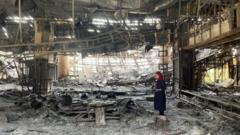With Ukraine questioning the timing and intent, the announcement stirs debate on Russia's true motives amid allegations of previous violations.
**Putin's Latest Ceasefire: A Genuine Effort or Just Another PR Stunt?**

**Putin's Latest Ceasefire: A Genuine Effort or Just Another PR Stunt?**
As Russia announces a three-day ceasefire, skepticism grows over its sincerity in the ongoing conflict with Ukraine.
In a recent move, Russian President Vladimir Putin declared a three-day unilateral ceasefire set to take place from May 8 to May 10, ostensibly to coincide with the 80th anniversary of the end of World War Two. This announcement follows a brief 30-hour ceasefire over Easter, which saw accusations of violations from both sides.
Russia framed the ceasefire as a humanitarian gesture, asserting that all military actions would halt during this period. However, Ukraine's government swiftly reacted, questioning why Russia could not commit to an immediate ceasefire and emphasizing the need for a much longer truce. “If Russia truly wants peace, it must cease fire immediately,” stated Ukrainian Foreign Minister Andrii Sybiha, pressing for an extended cessation of hostilities.
The skepticism surrounding the Kremlin’s motives is palpable, especially given the backdrop of Russia's prolonged invasion of Ukraine, which began over three years ago. Observers suggest that these ceasefire declarations may serve more as public relations maneuvers rather than genuine attempts to foster peace—an idea echoed following the Easter ceasefire when Ukraine accused Russia of repeated violations.
Former U.S. President Donald Trump, who has been a vocal observer of the conflict, recently expressed doubts about Putin's intentions. In a post on his Truth Social platform, Trump remarked on the continued missile strikes on civilian areas, suggesting that Putin might not genuinely seek to end the war but is instead playing a strategic game. Trump's stance underscores a growing fatigue with the situation from the U.S. administration, as they have pressed for a more sustainable ceasefire agreement that neither side has been able to solidify.
While Russia attempts to paint itself as a peacemaker, it's clear that both the Kremlin and Ukraine remain at odds. The announcement of this latest ceasefire is ripe for scrutiny, as critics and analysts wonder if it will yield any real progress in the fraught relationship between the two nations or if it is yet another maneuver to shift global perception.
Amid the rising tension and skepticism, the focus from Western powers remains on the need for a more lasting resolution to what has become one of the most pressing conflicts of our times. The dynamics are precarious, and as these ceasefire discussions unfold, the world watches with bated breath for any signs of substantive change.
Russia framed the ceasefire as a humanitarian gesture, asserting that all military actions would halt during this period. However, Ukraine's government swiftly reacted, questioning why Russia could not commit to an immediate ceasefire and emphasizing the need for a much longer truce. “If Russia truly wants peace, it must cease fire immediately,” stated Ukrainian Foreign Minister Andrii Sybiha, pressing for an extended cessation of hostilities.
The skepticism surrounding the Kremlin’s motives is palpable, especially given the backdrop of Russia's prolonged invasion of Ukraine, which began over three years ago. Observers suggest that these ceasefire declarations may serve more as public relations maneuvers rather than genuine attempts to foster peace—an idea echoed following the Easter ceasefire when Ukraine accused Russia of repeated violations.
Former U.S. President Donald Trump, who has been a vocal observer of the conflict, recently expressed doubts about Putin's intentions. In a post on his Truth Social platform, Trump remarked on the continued missile strikes on civilian areas, suggesting that Putin might not genuinely seek to end the war but is instead playing a strategic game. Trump's stance underscores a growing fatigue with the situation from the U.S. administration, as they have pressed for a more sustainable ceasefire agreement that neither side has been able to solidify.
While Russia attempts to paint itself as a peacemaker, it's clear that both the Kremlin and Ukraine remain at odds. The announcement of this latest ceasefire is ripe for scrutiny, as critics and analysts wonder if it will yield any real progress in the fraught relationship between the two nations or if it is yet another maneuver to shift global perception.
Amid the rising tension and skepticism, the focus from Western powers remains on the need for a more lasting resolution to what has become one of the most pressing conflicts of our times. The dynamics are precarious, and as these ceasefire discussions unfold, the world watches with bated breath for any signs of substantive change.






















